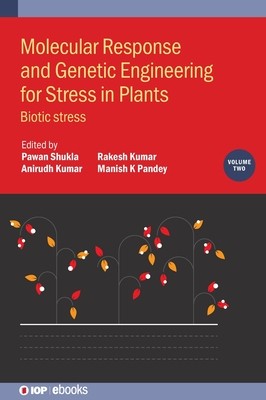
- We will send in 10–14 business days.
- Publisher: IOP Publishing Ltd
- Pages: 290
- ISBN-10: 0750349247
- ISBN-13: 9780750349246
- Format: 17.8 x 25.4 x 1.8 cm, kieti viršeliai
- Language: English
- SAVE -10% with code: EXTRA
Molecular Response and Genetic Engineering for Stress in Plants, Volume 2 (e-book) (used book) | bookbook.eu
Reviews
Description
Plants are confronted with various environmental stresses, the most prominent of which is biotic stress, which results in yield losses. Biotic stresses include damage caused by microorganisms like bacteria, viruses, fungi, parasites, insects, weeds, and native plants. It occurs to variable degrees in almost all agricultural ecosystems globally. Fungi, bacteria, or viruses may not be present in a given year, although they usually reduce output in the majority of years. Due to changing environmental conditions, plants struggle to attain their full genetic potential for growth and reproduction. This book focuses on understanding the physiological, biochemical, and molecular changes in stressed plants and the mechanisms underlying biotic stress tolerance in plants.
Key Features:
- Explains the different molecular mechanisms and genetic engineering strategies which have been developed and adopted to cope with consistent environmental changes and global climate change.
- It explores the latest developments concerning abiotic and biotic stress response at the molecular level for the improvement of crop quality and sustainable agriculture.
- It presents an exploration of the challenges and conceivable solutions to improve yields of the staple of food crops using data on agricultural sciences and omics technology.
- It discovers how the better understanding of molecular mechanisms of plant response to different stress would be used to improve the quantitative and qualitative features of crop plants and allied areas.
- There will be an inclusion of end-of-chapter problems and case studies.
EXTRA 10 % discount with code: EXTRA
The promotion ends in 21d.16:18:01
The discount code is valid when purchasing from 10 €. Discounts do not stack.
- Publisher: IOP Publishing Ltd
- Pages: 290
- ISBN-10: 0750349247
- ISBN-13: 9780750349246
- Format: 17.8 x 25.4 x 1.8 cm, kieti viršeliai
- Language: English English
Plants are confronted with various environmental stresses, the most prominent of which is biotic stress, which results in yield losses. Biotic stresses include damage caused by microorganisms like bacteria, viruses, fungi, parasites, insects, weeds, and native plants. It occurs to variable degrees in almost all agricultural ecosystems globally. Fungi, bacteria, or viruses may not be present in a given year, although they usually reduce output in the majority of years. Due to changing environmental conditions, plants struggle to attain their full genetic potential for growth and reproduction. This book focuses on understanding the physiological, biochemical, and molecular changes in stressed plants and the mechanisms underlying biotic stress tolerance in plants.
Key Features:
- Explains the different molecular mechanisms and genetic engineering strategies which have been developed and adopted to cope with consistent environmental changes and global climate change.
- It explores the latest developments concerning abiotic and biotic stress response at the molecular level for the improvement of crop quality and sustainable agriculture.
- It presents an exploration of the challenges and conceivable solutions to improve yields of the staple of food crops using data on agricultural sciences and omics technology.
- It discovers how the better understanding of molecular mechanisms of plant response to different stress would be used to improve the quantitative and qualitative features of crop plants and allied areas.
- There will be an inclusion of end-of-chapter problems and case studies.


Reviews